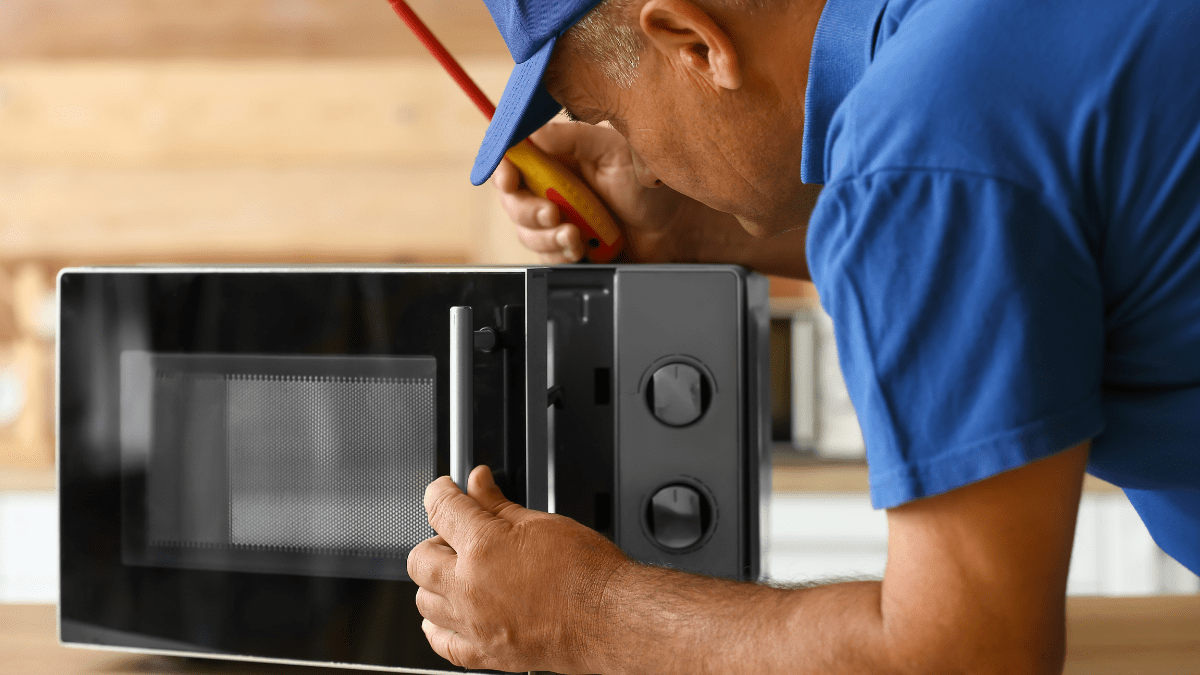Essential Microwave Repair Tips to Fix Common Issues
Microwave Repair Tips: Microwaves are indispensable in today’s kitchens, providing quick and convenient cooking solutions. However, like any appliance, they can develop issues over time. Whether your microwave is not heating, making strange noises, or experiencing other problems, knowing how to troubleshoot and repair common issues can save you time and money. This comprehensive guide covers essential microwave repair tips, including practical solutions for heating problems, door issues, and more. With these tips, you can keep your microwave running smoothly and ensure it remains a reliable part of your kitchen routine.
Microwaves are a staple in modern kitchens, offering convenience and speed when it comes to cooking and reheating food. However, like any appliance, microwaves can encounter issues over time. Understanding how to troubleshoot and repair common problems can save you both time and money. This guide provides essential microwave repair tips to help you address frequent issues with ease and confidence.
1. Microwave Not Heating
Why It’s Important: A microwave that doesn’t heat is essentially useless. Addressing this issue promptly can restore its functionality and ensure you’re not left without a key kitchen appliance.
Possible Causes and Solutions:
- Check the Power Supply: Ensure the microwave is properly plugged in and that the outlet is functioning. Test the outlet with another device to confirm.
- Inspect the Door Seal: A damaged or dirty door seal can prevent the microwave from operating correctly. Clean the seal and check for any visible damage. Replace it if necessary.
- Examine the Magnetron: The magnetron is responsible for generating heat. If it’s faulty, the microwave won’t heat. Replacing a magnetron is complex and typically requires professional help.
- Test the High-Voltage Diode: A malfunctioning diode can prevent the microwave from heating. Test the diode with a multimeter and replace it if needed.
2. Microwave Sparks or Arcs
Why It’s Important: Sparks or arcing inside the microwave can be a fire hazard and indicate underlying issues that need to be addressed.
Possible Causes and Solutions:
- Remove Metal Objects: Ensure there are no metal utensils or containers inside the microwave. Metal can cause sparks and arcing.
- Check for Damage: Inspect the interior of the microwave for any signs of damage, such as chipping or peeling of the interior coating. Damaged surfaces can lead to arcing.
- Clean the Microwave: Food particles and grease can cause sparks. Clean the interior thoroughly, including the turntable and the microwave’s cavity.
3. Microwave Not Turning On
Why It’s Important: If your microwave won’t turn on, you’re left with a non-functional appliance. Diagnosing and fixing the issue is crucial to restoring its use.
Possible Causes and Solutions:
- Inspect the Power Cord: Check the power cord for any visible damage. Replace it if it’s frayed or broken.
- Test the Fuse: A blown fuse can prevent the microwave from turning on. Locate the fuse (usually found in the control panel) and replace it if necessary.
- Examine the Door Switch: If the door switch is malfunctioning, the microwave may not start. Test the switch with a multimeter and replace it if needed.
4. Microwave Door Won’t Close Properly
Why It’s Important: A door that doesn’t close properly can affect the microwave’s operation and safety. Addressing this issue promptly is essential.
Possible Causes and Solutions:
- Check the Door Latch: Inspect the door latch for any obstructions or damage. Clean or adjust the latch as needed.
- Inspect the Hinges: Damaged or misaligned hinges can prevent the door from closing properly. Realign or replace the hinges if necessary.
- Clean the Door Seal: A dirty or sticky door seal can affect the door’s closure. Clean the seal thoroughly and ensure it’s free of debris.
5. Microwave Plate Not Spinning
Why It’s Important: The turntable or plate inside the microwave ensures even cooking by rotating food. If it’s not spinning, you might experience unevenly cooked food.
Possible Causes and Solutions:
- Check the Turntable Motor: The turntable motor is responsible for rotating the plate. Test the motor with a multimeter and replace it if it’s faulty.
- Inspect the Turntable Support: Ensure the turntable support (the rotating ring) is properly aligned and free of debris.
- Clean the Turntable: Food particles can obstruct the turntable’s movement. Clean the turntable and its support thoroughly.
6. Microwave Buttons or Control Panel Not Working
Why It’s Important: Non-functional buttons or a control panel can make operating the microwave difficult or impossible. Identifying the cause and fixing it is crucial for usability.
Possible Causes and Solutions:
- Check the Control Board: The control board manages the microwave’s functions. If it’s malfunctioning, it may need to be replaced.
- Inspect the Wiring: Loose or damaged wiring can affect the control panel’s functionality. Check the wiring connections and repair or replace as needed.
- Clean the Control Panel: Dirt and grime can affect button responsiveness. Clean the control panel with a damp cloth and avoid using harsh chemicals.
7. Microwave Making Unusual Noises
Why It’s Important: Unusual noises can indicate internal problems or wear and tear. Addressing these noises can prevent further damage and ensure proper operation.
Possible Causes and Solutions:
- Inspect the Turntable: A noisy turntable can be caused by misalignment or debris. Check and clean the turntable and its support.
- Check the Fan: The fan helps cool the microwave’s components. If it’s making noise, it may need cleaning or replacement.
- Examine the Roller Guide: The roller guide, which helps the turntable rotate, can become worn or damaged. Inspect and replace it if necessary.
8. Microwave Emits a Burning Smell
Why It’s Important: A burning smell from the microwave can be a sign of overheating or electrical issues. Identifying the cause and addressing it promptly is crucial for safety.
Possible Causes and Solutions:
- Inspect for Food Residue: Burnt food residue can cause a burning smell. Clean the interior thoroughly, including any food particles or spills.
- Check for Overheating: Ensure the microwave is not running for extended periods or overheating. Allow it to cool down if necessary.
- Examine Electrical Components: A burning smell could indicate electrical issues. Inspect the wiring and components for damage and consult a professional if needed.
9. Microwave Display Not Working
Why It’s Important: A non-functional display can make it difficult to monitor and control your microwave’s settings. Fixing this issue restores full functionality.
Possible Causes and Solutions:
- Check the Power Supply: Ensure the microwave is receiving power and that the outlet is functioning correctly.
- Inspect the Display Board: The display board controls the microwave’s screen. If it’s malfunctioning, it may need replacement.
- Clean the Display: Dirt and moisture can affect the display. Gently clean it with a dry, soft cloth.
10. Microwave Turns Off Unexpectedly
Why It’s Important: An appliance that turns off suddenly can be inconvenient and may indicate underlying problems. Diagnosing and fixing the issue is essential for reliable operation.
Possible Causes and Solutions:
- Check the Ventilation: Ensure the microwave’s ventilation is not obstructed. Proper airflow is crucial for preventing overheating.
- Inspect the Thermostat: The thermostat regulates the microwave’s temperature. If it’s faulty, it can cause the unit to shut off. Test and replace it if necessary.
- Examine the Internal Components: Internal issues, such as a malfunctioning fuse or circuit board, can cause the microwave to turn off. Consult a professional if needed.
Conclusion
Maintaining and repairing your microwave doesn’t have to be a daunting task. By following these essential repair tips, you can address common issues and keep your appliance running smoothly. Regular upkeep and prompt attention to problems will not only extend the life of your microwave but also ensure that it operates safely and efficiently. If you encounter issues beyond basic repairs, don’t hesitate to seek professional assistance to ensure proper handling and avoid potential hazards.

